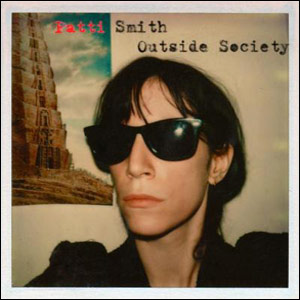
Outside Society
Legacy
The past five years have been kind to Patti Smith. Whether she’ll admit to it or not, she is undergoing one of those resurgences only experienced by the high and mighty of the rock & roll kingdom. Not that “making it” was ever her goal in the first place, but the literary and musical ingenue has had quite the prolific career, one of legend, in fact. In 2007, she was inducted into the Rock and Roll Hall of Fame (one of only a relative handful of women). In 2010, her memoir recounting her affairs with iconoclast photographer Robert Mapplethorpe, Just Kids, was published and won a National Book Award. So this month’s release of her best-of album, Outside Society, is really just icing on the proverbial cake.
Outside Society is, at its core, a chronology of Smith’s life as a musician, beginning with those infamous first lines from her 1975 debut, Horses. With her trademark yowl, she declares, “Jesus died for somebody’s sins, but not mine,” and launches into a blistering personalized rendition of “Gloria.” She has always been the consummate front woman—defiant, articulate and animated—but the song selection (chosen by Smith herself) is a fitting tribute to the Patti Smith Group as well. Tracks like “Pissing in a River,” from 1976’s Radio Ethiopia, showcase the piano prowess of the late Richard Sohl and Lenny Kaye’s omnipresent guitar. By the time the live cut of the passionately poetic “Rock and Roll Nigger” (which contains the line from which the album takes its name) rolls around, it’s clear that Society is a paradigm, as it’s comprised of tracks on which Smith is at both her finest and most accessible. It’s all there: from the self-empowerment and political activism of “Free Money” and “1959” to the earnest tribute to her future (at the time she wrote it) husband, MC5’s Fred “Sonic” Smith.
Outside Society isn’t as comprehensive as 2002’s double-disc anthology, Land, but then again, with the rights to Just Kids optioned for a movie, now is the time to turn a younger generation on to this rock & roll icon. Society is so easily digestible that it makes an ideal introduction for those who may not be terribly familiar with Smith’s work outside of her memoir. It also provides a profound body of song from which to draw reference when reading about her adventures. Though the album may not satiate diehard fans with its song selection, we should all take pleasure in the fact that Smith has effectively created a mixtape of her own songs for us, and, as anyone who has lived through the heyday of a high school crush can attest, that’s about as intimate as it gets.
What’s exceptional about Patti Smith is that despite a career spanning decades (small hiatuses in the ’80s and ’90s notwithstanding), she has never seemed to lose touch with her fans, or more importantly, her ideals, which is further proof that she makes music to satisfy solely herself. The simplistic, punk-influenced guitar riffs on “Glitter in Their Eyes” evidences that she’s still sticking to her roots, despite a millennial shift. Even better still is her haunting cover of “Smells Like Teen Spirit”—an easy feat for no one. I’d like to pretend this is some secret, roundabout acknowledgement of her status as a riot grrrl predecessor and proto-punk icon, but surely Smith’s humility wouldn’t allow for it.
The album ends much as it begins with the beautiful “Trampin’,” from her 2004 album of the same name. As she says in the song, after all these years, she’s still trampin’ along, pondering religious convictions. From her declaration that Jesus did not die for her sins to her uncertainty about reaching heaven, I can’t help but feel there’s a bookend missing. Does the uncertainty mean more music? Could another album work through this question and others? Hell if I know, but with all the momentum behind her of late, I’m keeping my fingers crossed.
Jennifer Farmer
PAST PERFECTS
Iggy Pop, Roadkill Rising... The Bootleg Collection 1977-2009
Archers of Loaf, Icky Mettle
Culture, Two Sevens Clash
The 3Ds, Early Recordings 1989-90
Stone Coal White, Stone Coal White
Father's Children, Who's Gonna Save the World
Paul McCartney, McCartney and McCartney II
Peter Tosh, Legalize It and Equal Rights
Sebadoh, Bakesale
Love, Black Beauty
Reatards, Teenage Hate
DOA, Something Better Change and Hardcore 81
Simple Minds, Sparkle in the Rain
Mercury Rev, Deserter's Songs
